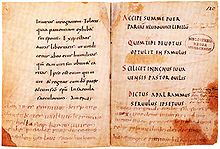- Muspilli
-
El Muspilli es una de las dos únicas piezas supervivientes de la poesía épica en antiguo alto alemán, junto con el Cantar de Hildebrando), que data de alrededor del 870. Uno de los fragmentos mayores del texto ha sobrevivido en los márgenes y páginas vacías de un códice marcado como propiedad de Luis el Germánico y actualmente se encuentra en la Biblioteca Estatal de Baviera (cim. 14098). el principio y el final del poema no se ha conservado. Fue redescubierto en 1817 y su edición príncipe se imprimió en 1832 por Johann Andreas Schmeller, quien también lo tituló Muspilli, en referencia a una palabra central en el texto.
Algunas teorías indican que se trata de una versión cristianizada del Ragnarök, con figuras del siglo XIII cambiadas por otras cristianas.[1] Grau propone una conexión de todo el material del poema, excepto para dos versos del teólogo del siglo IV San Efrén de Siria.[2]
La etimología del título
La etimología y significado del término Muspilli (un hapax legomenon en antiguo altoalemán, a través de formas del vocablo de las que existen formas en el sajón antiguo y en el nórdico antiguo no queda clara, pero se cree que podría describir algún tipo de fin cataclísmico del mundo por el fuego (ekpirosis). El poema es un ejemplo de cristianismo germánico primitivo, combinado con elementos del paganismo germánico y conceptos bíblicos cristianos, en los que aparecen Elías, el Anticristo y el juicio final.
referencias
- Keary, Charles Francis (1882). Outlines of Primitive Belief Among the Indo-European Races. C. Scribner's sons.
- G. Grau (1908). Quellen und Verwandtschaften der Älteren germanischen Darstellungen des Jüngsten Gerichtes. Halle.
Enlaces externos
 Wikisource en alemán contiene obras originales sobre el Muspilli.Wikisource
Wikisource en alemán contiene obras originales sobre el Muspilli.Wikisource- Muspilli (Text)
- Audio 1
- Audio 2
- Po
Categorías:- Poemas épicos
- Mitología germánica
- Literatura de Alemania
- Escatología
Wikimedia foundation. 2010.

